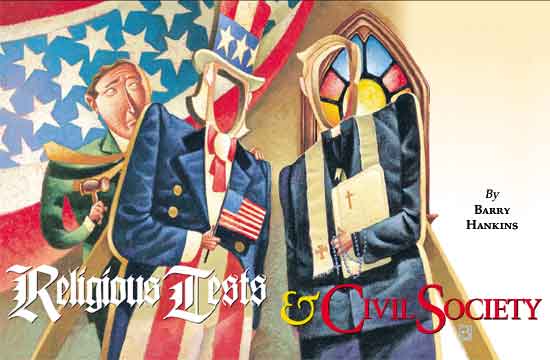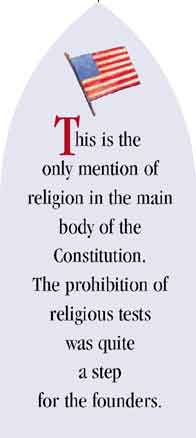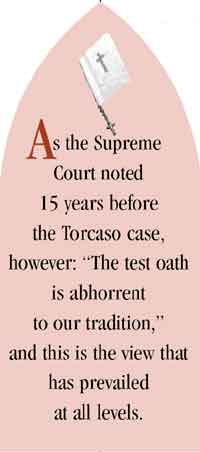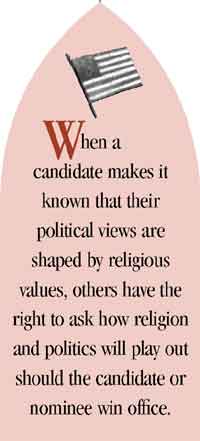Religious Tests And Civil Society
Barry Hankins March/April 2004
Getting your Trinity Audio player ready...

In July of last year advertisements appeared in the newspapers of Rhode Island and Maine showing a courtroom door with a sign reading "Catholics Need Not Apply." The ads had been placed by an organization called the Committee for Justice (CFJ), which is led by C. Boyden Gray, former White House counsel to President George H. W. Bush. The ads claimed, "Some in the U.S. Senate are attacking Bill Pryor for having 'deeply held' Catholic beliefs to prevent him from becoming a federal judge. Don't they know the Constitution expressly prohibits religious tests for public office?" William Pryor is Alabama's attorney general and had been nominated by President George W. Bush for a seat on the Eleventh Circuit Court of Appeals. Subsequent to the CFJ ads, the Washington Post published an editorial entitled "Beyond the Pale" (July 26, 2002), which called the CFJ's claims "wildly inappropriate." Just where is the line between appropriate probing of public figures' political or judicial views and an inappropriate and possibly unconstitutional religious test for office?
The prohibition against religious tests for office could not be clearer. It appears in Article VI of the United States Constitution and reads, "no religious test shall ever be required as a qualification to any office or public trust under the United States." This is the only mention of religion in the main body of the Constitution. The prohibition of religious tests was quite a step for the founders. Test oaths were common during the Colonial and early national periods of American history.

Article VI of the U.S. Constitution does not apply to states, however, so the oaths remained in place in many states for a long time. Even today some state constitutions retain test oaths. The Massachusetts state constitution, for example, has an oath that reads, "I _________ do declare that I believe the Christian religion, and have a firm persuasion of its truth." A later amendment replaces that oath with a general oath swearing allegiance to the commonwealth of Massachusetts "so help me God." The amendment then provides that Quakers, because of their prohibition against swearing oaths, can replace the word "swear" with "affirm" and omit the words "so help me God." The Texas constitution contains this puzzling oath: "No religious test shall ever be required as a qualification to any office . . . ; nor shall any one be excluded from holding office on account of his religious sentiments provided he acknowledge the existence of a Supreme Being." As one can see, the same sentence proscribes religious oaths, then requires officeholders to hold a belief in a Supreme Being. In the 1980s the notorious atheist Madalyn Murray O'Hair attempted to challenge the Texas test oath, only to be rebuffed by the courts because she lacked standing to sue. The oath had never been applied to her, and she was not even running for office. These and other state religious tests for office are unenforced and unenforceable because of two U.S. Supreme Court cases, one in 1961 and another in 1978.
The first of these was Torcaso v. Watkins (1961). Torcaso was appointed notary public but was denied his commission because he would not affirm belief in God as was required by the Maryland state constitution. He challenged Maryland's test oath on First and Fourteenth Amendment grounds. The Fourteenth Amendment forbids states from denying individuals liberty without due process of law. Through the doctrine known as incorporation the Supreme Court has used the liberty component of the due process clause to make most of the rights in the Bill of Rights applicable to the states. The reasoning is that to deny a person his or her right to free exercise of religion, free speech, or other fundamental rights is to deny that person's liberty. The First Amendment's free exercise clause was first applied to the states in Cantwell v. Connecticut (1940); then the establishment clause was incorporated in Everson v. Board of Education (1947). In Torcaso, rather than consider whether Article VI of the U.S. Constitution applied to state officers, a unanimous court used the First Amendment's free exercise clause, made applicable to the states via the Fourteenth Amendment, to strike down Maryland's religious test oath and by implication those in other states as well. Justice Hugo Black wrote for the majority, "This Maryland religious test for public office unconstitutionally invades the appellant's freedom of belief and religion and therefore cannot be enforced against him."4
The second case involving a religious test for office was McDaniel v. Paty (1978). By 1976 Tennessee was the only state that still banned ministers from serving in the state legislature, a practice that had existed in various places since the days of Puritan Massachusetts in the seventeenth century. Tennessee's prohibition was extended to candidates for the state constitutional convention, which was scheduled to meet in 1977. When Baptist minister Paul

Although the Supreme Court has invalidated state religious tests for office, some scholars believe that Article VI of the U.S. Constitution was merely a federalist jurisdictional maneuver intended only to leave the issue of religious test oaths to the states. Evidence for this position is that many of the same individuals who supported Article VI also supported the continuation of religious tests at the state level. As the Supreme Court noted 15 years before the Torcaso case, however: "The test oath is abhorrent to our tradition," and this is the view that has prevailed at all levels.6 The consensus on the unconstitutionality of test oaths apparently led Committee for Justice leaders to believe they had a strong charge against Democrats. The CFJ believed that if it could show that Democrats were using a religious test against William Pryor, public opinion would turn, and Pryor's nomination might succeed. Moreover, if successful in convincing people that Democrats were anti-Catholic, the CFJ could drive a wedge between Catholics and the Democratic Party. This explains why the ads were placed in heavily Catholic states.
The issue at the center of all this is, of course, abortion. Routinely, candidates for federal judgeships are queried about Roe v. Wade (1973). The abortion issue often appears to be a litmus test liberal senators apply to conservative nominees, but in fact roughly 140 Bush nominees had been confirmed before Pryor's nomination, and many oppose abortion but were still able to garner some Democratic votes. The question often turns on how often and how strongly a nominee has spoken out on abortion and whether a candidate's opposition is firmly rooted in religious conviction. Pryor is on record as saying that Roe v. Wade is "the worst abomination of constitutional law in our history."7 At the same time, however, as attorney general he advised his state to enforce its own abortion regulations only insofar as they were consistent with Roe v. Wade. Still, the fact that Pryor is Catholic and strongly opposed to abortion leads some Democrats to question whether he can set aside his religious views and fairly administer the law.
The CFJ ads seem to be based on the following reasoning or something like it: Democrats oppose Pryor because he has deeply held religious beliefs about abortion; Pryor's deeply held religious beliefs about abortion come from his Catholic faith; therefore, Democrats are anti-Catholic. This line of reasoning was not completely new. Senators Orrin Hatch (R-Utah), Rick Santorum (R-Ohio), and majority leader Bill Frist (R-Tennessee) have been floating the religious test argument for some time, while back in March 2002 more than three dozen members of the U.S. House of Representatives sent a letter to the Senate Judiciary Committee asking that members repudiate the liberal lobby People for the American Way and other groups that were making religion an issue in their attempt to derail the nomination of Charles Pickering. Pickering, a former president of the Mississippi Baptist Convention, was accused of promoting religion from the bench. The letter to the Senate Judiciary Committee reminded senators of Article VI of the Constitution and charged, "Many of those opposing Judge Pickering's nomination are in effect arguing that a religious person is unqualified to serve in the federal judiciary because he cannot be trusted to separate his personal religious beliefs from his official duties."8 In June 2003, roughly the time the Pryor hearing began, the Catholic League registered its concern that there was a "quasi-religious test" being applied to Catholics. Catholic League director William Donohue acknowledged that while those who oppose Pryor were not guilty of applying a de jure (in law) religious test, they are guilty of applying a de facto (in fact) religious test. Donohue said that a de facto test "is every bit as unconstitutional as a de jure application."9
The charge that Democrats are applying a de facto anti-Catholic religious test for office is particularly ironic considering that Patrick Leahy, the senior Democrat on the judiciary committee, is Catholic. In addition to being labeled as opposed to his own church, Leahy was also called an "anti-Christian bigot" by a representative of the Traditional Values Coalition. The charge aired on CNN while Leahy was at Sunday morning Mass.10 Also ironic is the fact that while Pryor adheres to Catholic teaching on abortion, he does not follow church teaching on capital punishment, while for Leahy the reverse is true. Finally, the Republicans, not the Democrats, first brought up the issue of religion in Pryor's hearing.

Do the actions of the Democrats amount to an unconstitutional religious test for office, as Republicans charge? This depends on whether one is a strict constructionist in constitutional interpretation who believes that we should adhere to the original intent of the founders, or one who believes in the organic view, whereby we attempt
to apply the living spirit of the Constitution to issues unforeseen at the time the Constitution was written. The authors of Article VI were primarily concerned about actual laws that barred from office those who could not ascribe to some government-approved religious belief. In our present case there is no law saying that Catholics cannot be judges, and one can be reasonably sure that a pro-choice Catholic would have little trouble being confirmed, especially by the pro-choice Catholic Democrats in the Senate. By the standards of original intent, there is no religious test. If one adheres to the organic view, however, a case can be made that the spirit of Article VI is being violated when religion is injected into confirmation hearings. If it is true that Democrats will not confirm nominees who have deeply held religious beliefs that shape their judicial views, then there is a religious test occurring on at least an informal level.
The most significant irony of all this is that Republicans tout original intent, by which standard there is no religious test taking place, yet they say there is. Many Democrats, by contrast, espouse the organic view, or the living spirit of the Constitution, by which standard there is a religious test occurring, but they say there isn't. Both sides would do well to acknowledge that their opponents have something important to say. Republicans want Democrats to know that people cannot be required to compartmentalize themselves so that their religious values never instruct their political positions. It is unjust to insist that believers act as if their faith does not matter in public affairs, because to do so is to insist that people of all faiths adhere to the view that religion is merely a private matter, which is a view held by only some religious people. Democrats, on the other hand, believe Republicans should acknowledge that if candidates for various government positions form their political views on the basis of their religious values, others should feel free to oppose those political views without fear of being labeled anti-religious; otherwise people of faith would have a privileged position.
Unfortunately, the Pryor nomination process degenerated into one side implying that all public figures must accept the belief that religion is a private matter, while the other side insisted that it is acceptable to form one's political views on the basis of faith but an act of anti-religious prejudice for others to criticize or question those views. Faith and politics cannot always be separated into airtight compartments. To insist that a person is ineligible for office merely because they have deeply held religious views would be at least a de facto religious test, but when a candidate makes it known that their political views are shaped by religious values, others have the right to ask how religion and politics will play out should the candidate or nominee win office.
________________________
Barry Hankins is associate professor of history and church-state studies at Baylor University, Waco, Texas.
________________________
1 Quoted in John Witte, Jr., Religion and the American Constitutional Experiment: Essential Rights and Liberties (Boulder, Colo.: Westview Press, 2000), p. 46.
2 Daniel L. Dreisbach, "The Constitution's Forgotten Religion Clause: Reflections on the Article VI Religious Test Ban," Journal of Church and State 3 8 (Spring 1996): 263.
3 Ibid.
4 Torcaso v. Watkins, 367 U.S. 488 (1961).
5 McDaniel v. Paty, 435 U.S. 618 (1978). See Robert Miller and Ronald Flowers, Toward Benevolent Neutrality: Church, State, and the Supreme Court, fifth ed. (Waco, Tex: Baylor University Press, 1996), p. 736. The 1946 case was Girouard v. United States.
6 Quoted in Miller and Flowers, p.736. The case was Girovard v. United States (1946).
7 Quoted in Washington Post, Apr. 11, 2003, p. A26.
8 "House Members Urge Senators to Repudiate Religious Tests for Judges," press release, Republican Study Committee, Mar. 13, 2002.
9 "Religious Test Applied to Bill Pryor," news release, Catholic League for Religious and Civil Rights, June 9, 2003.
10 Eleanor Clift, "Using Catholicism," Newsweek (Web exclusive), Aug. 8, 2003.
11 Statements of Senator Orrin Hatch and Senator Patrick Leahy, Senate Judiciary Committee, Nomination Hearing, June 11, 2003.